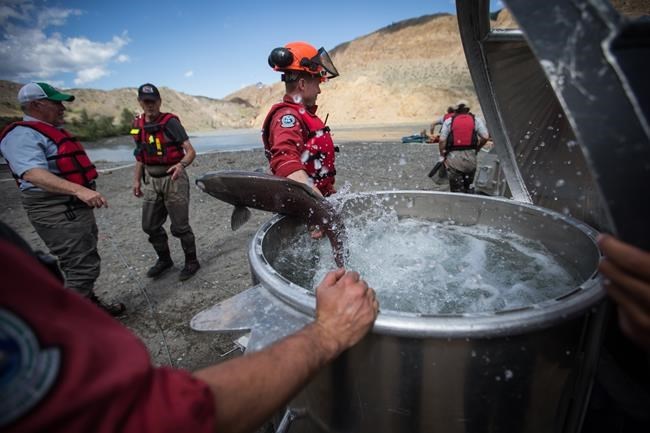VANCOUVER — Fisheries and Oceans Canada has awarded a contract that would see a permanent fishway built to help fish migrate past a massive landslide on a remote stretch of British Columbia's Fraser River.
The landslide response team has been in crisis mode since the discovery of the slide, said Fisheries Minister Bernadette Jordan. She has described its volume as equivalent to a building 33 storeys high by 17 storeys wide.
The slide created a five-metre waterfall and prompted a range of efforts to help salmon migrate to spawning areas, including transporting fish by truck and helicopter, building a nature-like fishway and even using a pneumatic pump dubbed the "salmon cannon."
But Fisheries and Oceans said record-breaking high water levels in the Fraser River this year affected the migration of salmon that are already facing threats including habitat degradation and warming ocean waters.
It announced Wednesday that an analysis in July determined a permanent fishway is the only reliable, long-term solution to getting the fish past the slide site.
Michael Crowe, manager of biological programs for the landslide response, said salmon stocks were already in poor condition prior to the slide, and they sought a solution that would ensure fish passage as fast as possible.
"We could have continued to try blasting and removing rock, but there was less certainty with regards to how long that would take, how may seasons and how much material would be able to be removed," he said in a briefing.
The federal government has awarded Burnaby-based Peter Kiewit Sons a contract worth $176.3 million to design and build a fishway that's expected to be operational by the start of the 2022 Fraser River salmon migration.
More than 160,000 salmon migrated past the slide and close to 10,000 were moved by the pump system and trucks this year, while 60,000 were helped over in 2019 and 245,000 swam past on their own, the Fisheries Department said.
It's believed the massive landslide north of Lillooet occurred in late 2018, but it wasn't discovered until June 2019, after fish had already begun arriving.
Federal officials have said early runs of Stuart sockeye and chinook salmon were devastated in 2019 because they couldn't make it upriver.
The decision to install a permanent fishway comes as the Committee on the Status of Endangered Wildlife in Canada assessed seven more southern B.C. Chinook salmon populations as threatened or endangered, adding to the 12 it has already classified under those categories.
The committee is recommending that chinook in the Lower Fraser River be listed as endangered on Canada's species at risk registry, meaning the species faces imminent extinction or extirpation from that area.
Chinook are a key food source for the endangered southern resident killer whales that frequent the Salish Sea between Vancouver Island and the B.C. mainland during the summer.
The federal government decides whether to list a species on the registry after receiving a recommendation from the committee. Once listed, provisions under the Species at Risk Act apply to protect it.
A listing of endangered for chinook or any other species would mean a prohibition against harming the fish or destroying their critical habitats.
Asked about the possibility of chinook and other Pacific wild salmon species being listed as endangered, Jordan said Ottawa makes decisions based on science and it's assessing the committee's recommendations.
"We know that there are a number of populations that are in decline, significantly, so making sure that we're addressing the issues as they come to us is something that's going to be critical for me as the minister to do everything we can to reverse the trend, because nobody wants to see any of the populations become extinct," she said in an interview.
Crowe said the federal government undertakes its own analysis after receiving a recommendation from the committee and a major event such as the landslide would be a factor.
"The further impacts to these populations from an event like (the slide) would be factored in the stock condition status and trend as well as recovery potential."
This report by The Canadian Press was first published Dec. 9, 2020.
This story was produced with the financial assistance of the Facebook and Canadian Press News Fellowship.
Brenna Owen, The Canadian Press



